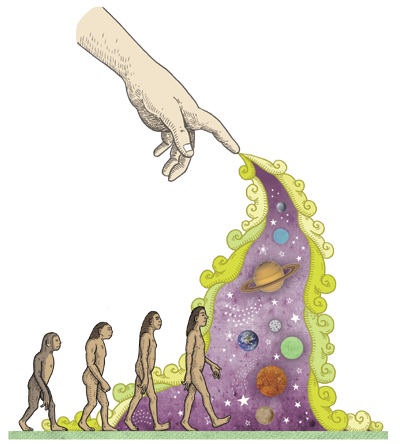Wow! Bruce Waltke and theistic Evolution
Bruce Waltke, the recently resigned prof from Reformed Theological Seminary – now at Knox Theological Seminary – does some fancy soft-shoeing after being recorded and posted in his views FOR theistic Evolution. Look here for a closer primary source on this issue and here for Justin Taylor’s much-more-expanded-than-mine blog.

I read through the article. The evidence in support of evolution – as he states – is overwhelmingly in support of microevolution (changes within kinds). This is significant, because after God spoke things into existence, microevolution would explain the biodiversity that we see in the fossil record and in present day ecosystems. To embrace theistic evolution AND purport to believe that Adam and Eve were the first humans, made in God’s image, etc. seems paradoxical. One of the tenets of evolutionary science is that individuals do not evolve – populations do. In the theistic evolutionary model Adam and Eve would need to have parents, and the micro-changes between one generation in evolutionary terms would be subtle at best, and most often not even noticeable.
I could go on, but I need to get some sleep so that I am worth something in your Sunday school class tomorrow morning 🙂
Can an Evangelical Christian Accept Evolution?
This response (by John, above) is attempting to point you toward Dennis Venema’s (Trinity Western University) teaching to prove on a very scientific level that common ancestry is the better, more scientific explanation for the created world. The first few parts, including the one here, build some principles of science and frankly take the common leap of assumption – namely, that Evolution (macro) has been successfully tested for 150 years. This statement is a presupposition at best and is really where the thinking Christian community really gets a little perturbed. We have never witnessed a species “birthing”, in any way, another species. We have never seen a so-called closely common species survive it’s “ancestral brother” by way of fit/might. We have only observed an existing [metaphor]400-mile cubed machine with millions of parts and started to take it apart. Then we notice a milieu of other machines that work in many ways the same, so we begin to start taking these apart – all the while, mind you, BEING that first machine and not, in any stretch of the imagination, even coming close to understanding what it truly means to be human by way of science. Science looks at humanity like a textual critique looks at a love-letter: they miss the point altogether and end up staying home alone on Saturday night. There has been no successful testing of macroevolution- that is, one species bearing another.
As Patrick mentions earlier, we have no problem, scientifically or otherwise, with microevolution- that is variations within the species. Jacob (my eldest) is a mini-me. Katherine (my youngest) is a mini-Jacob and me. Our middle child Ben, however, is a mini-Hugh – my wife’s father. This is very mild and simplistic, but you get the idea. Given crisis circumstances, those traits if focused and restricted would produce verifiable (to a degree) predicted results. This is how animal breading goes. In the case of hybridization (plants and animals), one still CANNOT hybrid between species, only within them. You can hybrid a lemon and a grapefruit, but NEVER a grapefruit and a barn-swallow. You can hybrid a bulldog and a great dane, but never a bulldog and a crappie. You get the point.
Venema, gets to the point in part 5 , here, and shows his hand while he is looking at a PART of the genomics of INSULIN in a human, chimpanzee and a gorilla. He finds a lot of similarities and shows numbers of odds within quintillions and provides seemingly impressive data – did I mention he is a FRUIT FLY scientist? Anyhow, this methodology could lead someone to look at all things blue: blue water, blue orchids, blue frogs, blue stone, etc.- and conclude that they are all from a common source. It is looking at the material that makes up a portion of a portion of a part of an ingredient of a component of a system of an organism and concluding origin.
Bad science, bad philosophy, blasphemous theology.
God made each animal “according to it’s kind” (Genesis 1-2 – and THIS IS a BOOK that has be tested successfully for thousands of years!)
As illustrated by Bruce Waltke, there is a pressing need within Christianity for a credible explanation of Genesis, one that respects the biblical text (1) yet allows for extensive time (backed by solid evidence) and (2) rejects evolution (random, undirected change) as a powerful constructive mechanism. Millions of years are not a cure for the severe limitations of random change.
I have just finished reading The Real Genesis Creation Story: A Credible Translation and Explanation at Last by J. Gene White. Of all the books I have read on the subject that attempt to explain Genesis, this is the most comprehensive, lucid and logical. Based on solid scientific evidence and his in depth analysis of the Hebrew text, he appears to have a translation and explanation of Genesis Chapter 1 and 2 that finally makes sense. Without giving away the main thesis of the book, I will say that he does not focus on redefining the terms, “day, create, make, heaven or earth.” He does not treat any verses as metaphorical, mythological or untrue. He does not view evolution as a powerful constructive force. His book can be ordered from the publisher’s website at http://www.sunnybrookepub.com/.
Thanks for this thorough thought, James. I would be interested in what you mean by “(backed by solid evidence)”? What evidence do you refer to?